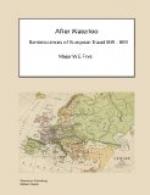Journey to Prague.
I left Vienna on the 28th August in a Landkutsche and arrived at Prague on the first of September.
These Landkutsche are on the same plan and footing with the vetture in Italy, and travel in the same manner, with this difference, however; that the Landkutscher do not usually, as the vetturini do, undertake to provide for the supper and bed of their passengers. In a word, you are not spesato; and in Germany there is not the least necessity for it, for there is no such thing as extortion on the part of the German innkeepers, who are by far the most respectable of that profession. Besides, in most places, everything is tariffed, and where it is not, the landlord never makes an unreasonable demand, or attempts to make foreigners pay more than natives; whereas in Italy if you are not spesato there are no bounds to the rapacity of the innkeepers, witness mine host of Terracina. Both Italy and Germany present the greatest convenience for travellers, as the Landkutsche or vetture are continually passing from town to town. There is however this difference between them, that the Italian vetturini will abate their price, if their carriage is full excepting one place, and that they must start, whereas the German Landkutscher never abate their price.
I paid for my journey from Vienna to Prague thirty-five florins Wiener Waehrung, and we made the journey in five days. Our first day’s journey brought us to Hoellabrunn, having stoppd to dinner at Stockeran. The road is excellent and the several towns and villages we past thro’ clean and well built. The landscape was either a plain, or gently undulating and extremely well cultivated.
Bohemia resembles Moravia, being an exceedingly rich corn country, generally open; not many trees about the country near the road side, except at the Chateau and farm houses. The language is a dialect of the Sclavonic, mixed with some German; but at the inns there is always one or two servants who speak German. In Bohemia a traveller not speaking German, and who has no interpreter with him, would find himself greatly embarrassed. The Bohemians call themselves in their own language Cherschky, and the Hungarians call themselves Magyar.
[117] Tasso, Gerusalemme liberata, canto XV, ottave 31, 32:
Un uom della Liguria
avra ardimento
All’ incognito
corao esporsi in prima...
Tu spiegherai,
Colombo, a un nuovo polo
Lontane si le
fortunate antenne...—ED.
[118] Ariosto, Orlando Furioso, XL, 31, 1.—ED.
[119] See reference to Eustace p. 131.
[120] Ariosto, Orlando Furioso, XXVIII, 38, 7.—ED.
[121] Boileau, Satires, XI, v. 117.
[122] The drama, Der Wold bei Hermannstadt,
is the work of Johanna
Fraenul von Weissenthurn (1773-1847),
a celebrated Viennese actress
and authoress. An opera
was written on the same text by W. Westmeyer,
—ED.




